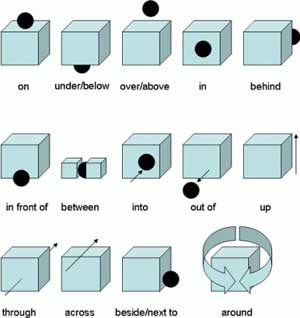I want to take one further look at little words in the Bible. Prepositions are marvelous little words because they explain relationships with precision
: comparison (like, as); direction (to, toward, through); location/place (in, at, by, on); possession (of); purpose (for); source (from, out of); and time (at, before, on). The Box in the title is a location, a place. Some teachers use a circle to illustrate these small words, but I prefer the visual three-dimensional box illustration.
 In the box illustration, the prepositions show their relationship or their position to the Box. They can also tell us why or when something takes place or they can give us a general description. One website lists 150 prepositions in the English language and the Bible Greek uses only around 17, nine of which depend on the grammar for their meaning. With a preposition in four out of five verses, they are everywhere in the Bible! (You will need an essentially literal translation for this!)
In the box illustration, the prepositions show their relationship or their position to the Box. They can also tell us why or when something takes place or they can give us a general description. One website lists 150 prepositions in the English language and the Bible Greek uses only around 17, nine of which depend on the grammar for their meaning. With a preposition in four out of five verses, they are everywhere in the Bible! (You will need an essentially literal translation for this!)
For example, in Deuteronomy 6:23 Moses speaks about the Jewish nation and the land of Egypt: “And he brought us out from there, that he might bring us in and give us the land that he swore to give to our fathers” (ESV). Speaking of Abraham, Stephen said in Acts 7:4, “Then he went out from the land of the Chaldeans and lived in Haran. And after his father died, God removed him from there into this land in which you are now living.” We are able to understand these journeys in the physical world because of the precision of prepositions.
In much the same way, we can understand spiritual truths with precision. I’m urging you to believe prepositions in a spiritual context as much as you believe them in the physical world. “Now unto him that is able to do exceeding abundantly above all that we ask or think, according to the power at work within us” (Ephesians 3:20). When we believe it we’ll start seeing the effects of the power of God at work within us; that’s where the power resides, in us! It is not in the church building or the congregation but in the individual, so you have it 24/7 as they say these days.
“Being freely justified by his grace, through the redemption that is in Christ Jesus” (Romans 3:24). All our blessings come by his grace, which is made available to us through the death and resurrection of Christ Jesus. “More than that, we also rejoice in God through our Lord Jesus Christ, through whom we have now received reconciliation” (Romans 5:11). It’s shouting time for believers! Through Christ we have much to rejoice about.
Yet another preposition is “with.” It is used in Paul’s letters as “with Christ,” and has to do with both past and future events. “But God… made us alive together with Christ — by grace you have been saved — and raised us up with him and seated us with him in the heavenly places in Christ Jesus” (Ephesians 2:4-6). God did this at the resurrection with Jesus. The old spiritual song asks, “Were you there when they raised him from the dead?” And now you can answer, “Yes!”, because in God’s eyes, Christ and you went through that event together. It was physically true of Christ and spiritually true for you.
As to the future, Paul declared, “My desire is to depart and be with Christ, for that is far better” (Philippians 1:24). It is always an interesting paradox for the Christian, because as we talk and sing about how wonderful heaven will be, our attitude is sometimes, “Not right now, Lord, if you don’t mind!” Paul went on to say, “But to remain in the flesh is more necessary Paul wrote the letter to the Galatians because of false teachers who were trying to mix the Jewish faith based on works with the Christian faith based on grace. “Yet [through] because of false brothers secretly brought in — who slipped in to spy out our freedom that we have in Christ Jesus, so that they might bring us [down] into slavery” (Galatians 2:4). Galatians also gives us a powerful summary of the Christian life. “I have been crucified with Christ. It is no longer I who live, but Christ who lives in me. And the life I now live in the flesh I live by faith in the Son of God, who loved me and gave himself for me” (Galatians 2:20). So again, I urge you to read what is written, and then to pause and think about the precision of God’s Word to you.“Now we did not receive the spirit of the world, but the Spirit which is from God, in order that we might know the things freely given to us by God” (II Corinthians 2:12).



AMAZING!! Thank you for teaching this! It’s easier to understand what God is saying when you can visualize what these prepositions are depicting.
Wow…thanks!!!
concerning all that you wrote here…